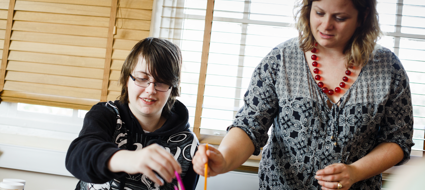The role of an intermediary in family and criminal proceedings
Published:
This podcast looks at the role of an intermediary and how it is important in any work with families, but particularly with court cases.
Hannah Scott, Research and Development Officer at Research in Practice and qualified social worker speaks to Kerry Chatterje who works as an Intermediary for an organisation called Triangle. They discuss the role of an intermediary and how it is not uncommon in social work to be involved without the social worker present.
[Introduction]
This is a Research in Practice podcast, supporting evidence-informed practice with children and families, young people and adults.
Hannah: Welcome to this Research in Practice podcast. My name's Hannah Scott, I'm a Research and Development Officer at Research in Practice and I'm also a qualified social worker. I'm going to let Kerry introduce herself, as well.
Kerry: Hi, I'm Kerry Chatterje and I am an intermediary, I work for an organisation called Triangle.
Hannah: Thank you. So, the aim of this podcast is to really talk about the role of an intermediary, to see if there's any transferable learning towards social work as well, and to help to really get an understanding of what the intermediary role is. I know, from my experience in social work and working, particularly in child protection, that there have been intermediaries who have worked with children that I've worked with but that's always been done behind closed doors. And for the right reasons, obviously, it's quite a private role but I think there's a lot of learning. And we have case law and legal summaries at Research in Practice and there's been a number of cases recently that have involved judgements with the involvement of intermediaries. There was one in particular, that was a really lovely judgement, actually, that highlighted the successful approach that was taken by an intermediary. We'll link this case and any other ones that are relevant, on our website, linked to this podcast. But it shows about the different approaches that have been taken, particularly with Covid and the virtual working and the virtual hearings, as well.
[The role of an intermediary]
So, if we start then Kerry, if you could just talk a little bit then about what is the role of an intermediary? What settings and different people do you work with, in your role? And who's responsible for your involvement and the one that gets you involved in the case?
Kerry: An intermediary facilitates communication between the court and parties within the court. And it's usually people who have learning disabilities or some mental health issues. Triangle work with young people up to the age of 30, although intermediaries in other organisations and independent intermediaries will work with people of all ages. We work in criminal and civil court, often with mothers in care proceedings. But quite recently, we've had a lot of children in care proceedings as well, that we're working with. And we can also be involved in suspect interviews, although that's quite rare.
Hannah: So, it's quite a broad range of people that you work with then, so it can be both the children and the adults, as well as the criminal and family proceedings. Who is it that will arrange your involvement and decide where it's appropriate, if an intermediary is needed to support somebody?
Kerry: That varies. Obviously, in the case of a suspect interview, that would either be the police or a solicitor. In criminal and family proceedings, it's usually the solicitor, I think, who would have most dealings with the client, who would realise that, actually, they're not really understanding enough, to be able to give instructions adequately. And so they would, usually, instruct us. But sometimes, you know, it can even get to court and maybe the judge will realise that something's not quite right and think that an intermediary should be involved.
Hannah: So, in terms of some of the reasons then, you might be asked to support, is that if there's a parent with either an impairment or a learning need? Or if it's very young children that might need that support in communicating then?
Kerry: Yes, absolutely. Like I say, it's quite often people with learning disabilities, ADHD, autism, some mental health issues or simply because of their age. You know, we will work with children, just because they're vulnerable due to their age.
Hannah: And I think you've mentioned about supporting in ABEs, so Achieving Best Evidence interviews. Is that something that is a requirement for all young people, when they're having those interviews? Or what is it that determines if somebody like yourself should be present for those interviews?
Kerry: There is a difference between a registered intermediary and a non-registered intermediary. A non-registered intermediary will soon become known as a court-appointed intermediary. So the registered intermediaries work on the Witness Intermediary Scheme which is run by the CPS (Crown Prosecution Service). And so, they will receive a referral through their process and they will work with a child in criminal proceedings. And during those proceedings, they will probably be involved in an ABE (Achieving Best Evidence interview). For a non-registered intermediary, we wouldn't normally be involved in ABE interviews but as part of the work that we do at Triangle, we also do forensic interviewing. So, the intermediaries that work for Triangle will probably have two or three different roles within the organisation. We are trained as forensic interviewers, so under that heading we would be involved in ABE interviews, which we would carry out, rather than police, in a criminal investigation. We would actually do the interview.
Hannah: Okay. So, would that be you leading the interview then, and asking those questions?
Kerry: Yes, absolutely, yes. As I say, registered intermediaries could be involved in ABE (Achieving Best Evidence) interviews, as an intermediary, with the police leading the interview.
[Supporting communication]
Hannah: What methods do you use then, to support people in their communication and to help them fully understand the proceedings that they're involved with?
Kerry: We always start off by doing an intermediary assessment, initially. So that involves finding out what their communication skills are. So how they answer questions, the language that they can understand, different question types, length of questions, auditory working memory, all of those kinds of things, what they know about the court process. And then from that, we would write a report which would go to the solicitor and then to the court. But things that we can do in court, we can arrange breaks, we can provide calming aids for people to handle, sort of, fiddle toys, things like that. And when people are being questioned, we have the right to intervene. We would do a Ground Rules Hearing, along with the judge and the advocates. In theory, that's how it should work, although it doesn't always work like that. But in theory, we would do a Ground Rules Hearing and our recommendations would then be approved by the judge, which would then become the ground rules for the trial or the hearing. So then, if those ground rules are not adhered to, we can intervene and request that questions are rephrased or that certain language isn't used, that kind of thing.
Hannah: What are the limits of your role then? Because it's not an advocacy role, about speaking on people's behalf, is it? It's about supporting them in communicating the best that they can. Are there any times where you can speak on behalf of people? Or is it more about just supporting them to contribute the best that they can?
Kerry: Certainly all the cases that I've worked with, people haven't had learning disabilities. I know, in earlier times, some of my colleagues have worked with people who've used, like, communication boards and that kind of thing, where they may have to decipher what's being said and then relay that to the court. I've never been in that position personally but that is something that an intermediary can do. But certainly, we don't answer questions for people. If somebody's speaking quietly, we can repeat what they've said. If somebody's gesturing, that the court may not see, we can alert the court to that. But we certainly don't answer questions on behalf of people.
[Impact of the Covid-19 pandemic]
Hannah: And how have you found that Covid and the pandemic has impacted on your role and your ability to support people? Obviously, it's something that's been discussed a lot anyway, just, I suppose, in all settings but particularly in social work, it's been so important to make sure that decisions are still made for children in a timely manner. But then, obviously the flip side of that, is having hearings that haven't felt as comfortable for people. Having to have virtual hearings where people might not have full internet access or some people even doing them on the phone. And so then, if you've got any additional learning needs on top of that, that's a really big challenge. So, have you found a difference in the work that you've been asked to do or the approaches that you've had to take?
Kerry: The work has been the same although previously, we would always do face-to-face assessments. Obviously, we've had to adapt our practice. So, we've done assessments on video platforms, various different video platforms. It does have its challenges but most things can be adapted so that they can be done. The assessment tasks can still be done in a similar way. And you just find ways of working and dealing with what you're handed. Hearings have been more challenging because if you have a young person who's joining by phone, then you can't really be in contact with them whilst the hearing is on. If you have somebody who's joining on a video platform, then you could converse by phone or by text whilst that hearing is going on. Quite often, the people that we do support might have difficulty using these various platforms, and find it difficult to join and participate fully.
Hannah: Have you found there have been any benefits? Because I think the case that I've mentioned at the beginning of our conversation, that was a case that had been made public in the judgement because of the praise it had given the intermediary. What they were actually able to do, so this was in a face-to-face hearing, and instead of the mother giving oral evidence, she gave written answers, by sitting in the witness box and typing in the answers, which was something that she felt more able to do and had the support to be able to read those questions before moving onto the next one, rather than having to give that verbal evidence on the stand as well. So I don't know, there may be virtual hearings that have had that benefit for people, I suppose. There have been some benefits to virtual working and those hearings. So, are you aware of any really big changes like that, that anyone's had to make? Or have most cases still happened face-to-face, where that's really felt to be needed?
Kerry: Personally, I think that any case that involves an intermediary, the intermediary needs to, at least, be with the young person somewhere, even if they're not in court, to be able to support them adequately. Case management hearings, I suppose it's okay to do those virtually and then just explain what's happened to the young person. That usually works quite well. But certainly, for some people, yes, it has been beneficial not having to be in the courtroom, you know, you might be working from a solicitor's office or a local authority building, just you and that young person. And for some people, yes, that is really beneficial. And in fact, again, now that is one of the things that we can recommend. If we think that a young person would cope better working that way, we can recommend that.
Hannah: That's great. So again, it's about picking out those positives of this different way that we've had to work, isn't it?
Kerry: Absolutely.
[Relationship between social workers and intermediaries]
Hannah: And so, are there are times that you come into direct contact with social workers? Because as I mentioned, you know, it's a role that I never really got to see directly, when I was in practice myself. So, are there many times that you would come into direct contact with a social worker? And is there any advice that you would, maybe, give social workers, from your role, in how they communicate with children or any, sort of, good learning examples that you've come across?
Kerry: We would only really see social workers during the court process. So now, it's usually virtually because even if we're in court, social workers are usually still on video. Although an intermediary is there to facilitate communication, and our duty is to the court, I think there is still some mistrust, perhaps, between the parties. And people think that you are on the side of the person that you're working with, rather than being there to help the court. I think, in my experience, it's not always apparent that social workers have learnt about the young person's needs and used that in their working practice. And I think that's vital, to be able to get the best and to be able to support people properly.
[Working with children and young people]
Hannah: And in terms of working with young people and supporting, sort of, particularly quite young children in contributing or talking about, maybe, some concerns or things that have happened, what approaches do you take to support children that, maybe, social workers may be able to learn from?
Kerry: We have a number of tools, actually, that Triangle use and we have resources that are available on our website. But we do have some things that Triangle have developed to help us in our practice. We have some magnetic figures. So, they're a 2D figure, with magnetic clothing. If it's something that's involving clothing and positions and that, kind of, thing, those things can be taken off. Outerwear, underwear, can all be taken off that model, if that's something that will help the young person to describe what's happened to them. And obviously, we would only use that in an interview situation. But we, quite often, use drawings in our assessments. You know, if it is a young, young person, they might benefit from being able to draw or, as you say, to write things down. And I worked with a child who didn't want to say something, particularly to the judge, and so she wrote it down for me to say. All of those things are helpful.
Hannah: And do you just provide support within, sort of, the legal arena? Or are you ever brought in to support in pre-proceedings work or in assessments before cases have got to, maybe, the family courts?
Kerry: Sometimes, yes. I've just done one recently, actually, where the judge had allowed a couple in the family proceedings to have a pre-assessment with a supported accommodation. And so, I was asked to sit in on that. We quite often get asked to sit in on conferences, to enable solicitors to take adequate instructions and just to make sure that people have understood what's being asked of them. One that I've done, that has been successful, I was involved right from the very start, practically after he was arrested, before they started any interview process. They were aware that he had some difficulties and got me involved then, and I was involved in the whole process. We interviewed, I was involved with the charging, we went to prison to charge him on various things. So that was a really good experience and really, really hands on policing, it was brilliant.
[Role of social workers in accessing intermediaries]
Hannah: So, if social workers or any practitioners feel that there's a need for an intermediary that's, maybe, not been identified to support either an adult or a child, within, maybe, proceedings or cases that they're working, would it be a matter of making sure it's raised with the advocates and highlighted to the judge, so that that can be opened up into a discussion?
Kerry: Yes, exactly. They would just need to raise it with the solicitor and then that would be raised with the judge.
Hannah: And does a judge have to consent then, for your involvement within any proceedings?
Kerry: Yes. Yes, the judge has to agree. And, I mean, to be honest, in family proceedings, I've never known a judge to refuse an intermediary, if it's thought that a party needs one. It's quite different in the criminal system. They, quite often, don't agree to have an intermediary and sometimes, they'll agree for evidence only, rather than the whole trial. It's quite difficult to support somebody that way and obviously, not meeting their needs. As far as I'm concerned, not meeting their needs. Obviously, it's the judge's decision and we just have to abide by what they decide.
Hannah: Yes. And I think what's also really important for social workers to do is, particularly, this has always been in the SWET template, which is the Social Work Evidence Template that the social workers have to complete, but there is a section there which is still included in a recently revised version of the SWET document, that will ask about how parents have been supported to make sure that they can fully participate and understand proceedings. And I think that's something that's obviously really important to consider. But this is a really key area where an intermediary can be used, can't it? And that can be something, I suppose, that if there are concerns, can be raised quite early in proceedings, to make sure that each individual has got the full chance to participate throughout each hearing.
Kerry: Absolutely, yes. I mean, the sooner we're involved, the better, for everybody really. And, you know, there are simple questions you can ask people to identify vulnerability, such as, if they've had any extra help in school, if they need help to fill in forms. You know, it's not too intrusive a process, it's quite simple to find out if people might need some extra help.
Hannah: So, thank you very much. That's been a really helpful conversation and we're hoping that it will give practitioners just a bit of an insight really about what happens in your role because it is such an important role. It's really helpful and I think there's a lot of learning there, as well, on communication. Thank you for that and thank you for listening to this podcast everybody.
[Outro]
Thanks for listening to this Research in Practice podcast. We hope you've enjoyed it. Why not share with your colleagues and let us know your thoughts on Twitter? Tweet us @researchIP.
It is important in any work with families, but particularly with court cases, that the family members are supported to have procedural fairness and can contribute equally to proceedings. Social workers also have to identify how this has been done in their legal evidence, on the Social Work Evidence Template (SWET), which was revised in March 2021.
The role of an intermediary is to assist with communication difficulties. An intermediary does not provide emotional support nor answer questions of behalf of a witness.
The specific Rule within the Family Procedure Rules (FRP) 2010 defines an intermediary to be a person whose function is to:
- communicate questions put to a witness or party,
- communicate the answers given by the witness or party in reply to them,
- explain such questions or answers so far as is necessary to enable them to be understood by the person asking the questions.
Talking points
This podcast looks at:
- The role of intermediaries in supporting families in court.
- How intermediaries support communication and participation within family and criminal proceedings,
- The process of getting intermediary involvement and identifying a vulnerable participant.
Resources mentioned in this podcast
- Family justice: Understanding the role of an intermediary: Views
- Social Work Evidence Template (SWET) | ADCS
Related case law
Recent case law that have referred to the use of an intermediary have been summarised in Case Law and Law Summaries and are outlined below:
- C (Children: Welfare) (No.2) [2020] EWFC B36
- This case was not an appeal but a judgment that noted the success of an innovative approach by an intermediary to support the mother to participate in the remote hearings.
- A & B (Children) (deaf parent – assessment and practice) [2021] EWFC 10
- This judgment stated that the local authority should have ensured that they explicitly identified how they fulfilled the requirement to communicate adequately with a deaf parent.
- T (Children), Re [2020] EWCA Civ 507
- In this judgment there was criticism that an intermediary had been used to support a child during an Achieveing Best Evidence (ABE) interview, who advised that the child was losing focus, however this was not responded to by the interviewer.
- S (Vulnerable Parent: Intermediary)[2020] EWCA Civ 763
- This judgment is regarding a mother who had a learning difficulty but capacity to instruct solicitors to oppose the adoption of her children. The solicitor and psychologist identified the need for an intermediary to support her. This was initially refused by the court but the mother successfully appealed.
Reflective questions
Here are reflective questions to stimulate conversation and support practice.
- From your experiences of working with an intermediary or listening to this podcast, are there any ways that have helped family member’s communication and participation which you could use in your own practice?
- What methods do you use to support parents communication and participation in pre-proceedings work? Do you consider using an intermediary at this stage?
Professional Standards
PQS:KSS - Communication | The law and the family and youth justice systems | Purposeful and effective social work | Creating a context for excellent practice
PCF - Diversity and equality | Rights, justice and economic wellbeing




